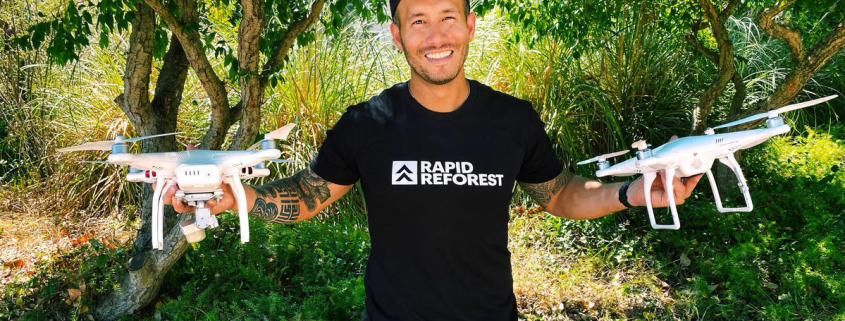Price alum uses drones to reforest land

USC Sol Price School of Public Policy alumnus Tomio Daumit began his nonprofit Rapid Reforest in January with an ambitious goal: planting one billion trees by 2030. The technological idea behind this objective? Creating drones capable of planting trees — and lots of them.
Six months into the pandemic, Daumit reassessed what he wanted to put his time and effort into. He decided he wouldn’t get back into corporate America, and instead wanted to “do something for the planet.” Inspired by soil’s carbon capture potential, which he learned about from the Woody Harrelson documentary, “Kiss the Ground” (2020), Daumit began toying with the idea of using the efficient technology of drones to reforest land.
“I thought [the documentary] was really cool, and there were some things in there about composting and all these other things and my brain started twirling,” said Daumit, who, after pursuing an undergraduate degree in graphic design, worked toward a masters in urban planning at USC, but hasn’t yet finished his degree. “I wanted to get into climate change and get something going.”
When Daumit figured out that he could plant trees using drones, his idea for Rapid Reforest was set.
Rapid Reforest drones are equipped with 3D printed attachments that spit seeds into the ground, which vary based on the ecosystem and climate of the targeted replanting site. The team reviews drone-conducted terrain mapping of the land to be reforested and plans for the kinds of trees, shrubs and bushes that fit the region.
The organization targets areas deforested from limber clearings and other commercial uses, and those impacted by wildfires.
“The thing about wildfires is that those areas are accustomed to having trees in the ecosystems or have been torched from them,” Daumit said. “It’s easier for us to go back in and replant where there’s already been forests, rather than go and try to replant in places that did have forests, but a long time ago, but are now used for different things.”
About 900 trees have been planted so far in the Los Angeles area using Daumit’s small drone and paintball guns — as, sometimes, the seeds being planted are similar in size to paintballs. The team planted fenced areas by hand, Daumit said, by throwing handfuls of seeds into yards and along highways.
The nonprofit is currently focusing on replanting areas in western California, Oregon and Washington, as all three regions share commonalities in climate and wildfire impacts. Daumit also reached out to some former professors of his in Brazil, where he did part of his postgraduate studies, to begin planning reforestation efforts there — specifically in the Atlantic Forest.
Matthew Marshall, Daumit’s partner, remembered the somewhat chaotic state their place was in during the drones’ development stage, when Daumit and Marshall tested various planting methods and mechanisms.
“We had all of the tests for the pods that would be coming from the drone — they were just everywhere. There [were] little dirt balls throughout the entire place, and the balcony was full of different testing pods to try planting these,” Marshall said with a laugh. “It really took over the house.”
Marshall and Daumit used to ski and snowboard together often and noticed that the slopes in their area started to shut down due to a lack of snow, which sparked their interest in sustainability and the ways nonprofit work can serve an environmental cause.
“I think that’s really when this started taking hold and — no pun intended — snowball,” Marshall said.
Daumit said Rapid Reforest’s goal to mitigate the impacts of climbing carbon emissions through increasing forest cover is one side to the “Swiss army knife” of combating climate change.
“Reforestation is not the only solution,” Daumit said. “There are so many different things or people coming up with different technologies and this and that, but what we can do — the cheapest right now — is planting trees because it’s not hard.”
Anna Micci, a friend and supporter of Daumit’s, said over the many years she’s known him, Daumit was always an advocate for addressing climate change and incorporating sustainability into day-to-day life: Micci recalled that he had advised her on a home solar project some time ago.
“[For Daumit], it was always about not how to make money, but how can we help?” Micci said. “How can we make it better? What are you guys doing on your behalf and what are you doing in your own house to make it better to live green and be sustainable?”
Rapid Reforest is raising funds through a GoFundMe page to upgrade to larger, more productive drones. The goal currently stands at $15,000, with $3,950 already raised. The team has also applied for several grants to support their work, a process that Daumit was new to.
The nonprofit also houses an educational aspect: Daumit has been developing ideas for sustainability education with his sister-in-law, a teacher working in Atlanta. One of the grants the organization applied for would fund the creation of boxes stuffed with information and materials to make the seed pods in an aim to teach children about climate change and tree replanting.
Daumit, who had worked at startups before starting Rapid Reforest — including an organization that tracked medical equipment in hospitals using Bluetooth technology — said getting help with nonprofit work has been comparably easier.
“One thing I learned [is at] a nonprofit, people are much more willing to talk to you and help you and give you money, rather than a normal startup,” Daumit said.
Sabine Keiser, who met Daumit when they were neighbors a few years ago, said his defining characteristics are his selflessness and kindheartedness.
“It’s all about giving and not demanding to have something in return,” Keiser said. “[Daumit] is someone who inspires people.”

